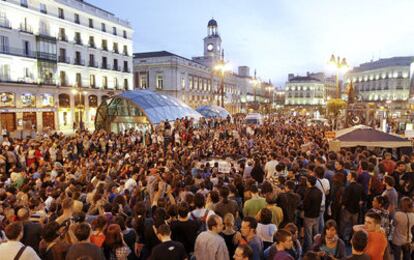Mainstream parties quickly taking up positions around protest movement
Socialist leader in Madrid urges disaffected youth to keep faith in party system
The popular protests dubbed 15-M (for May 15, the day of the first mass demonstration against Spain's political and economic situation) are already having an effect on the campaign for local and regional elections next Sunday.
Faced with growing criticism of the two-party system and claims that neither the ruling Socialists nor the opposition Popular Party (PP) truly represent the people- and in view of the snowball effect this message seems to be having in society- politicians of all colors on Tuesday felt compelled to take a stand, either to align themselves with the movement, or to contradict its negative views.
Socialist, PP and United Left (IU) leaders spoke out just hours after Madrid police disbanded a group of around 100 people who were attempting to spend Monday night in downtown Puerta del Sol plaza to demand a change in attitude from policymakers. It was the same request made by thousands of people in over 50 Spanish cities last Sunday.
IU leader Cayo Lara, whose campaign has focused on the shortcomings of both the PP conservatives and the Socialist government of Prime Minister José Luis Rodríguez Zapatero (who he accuses of selling out to the bankers and axing social entitlements), on Tuesday tried to place his organization at the center of the protest movement.
"We support this movement of rebellion and indignation because we are a part of it, but without being opportunistic or seeking the limelight," he said at a rally in Seville. "We don't want to lead [the protesters]."
As protestors of the so-called 15-M movement settled in for a second night in Madrid's Puerta del Sol, the United Leftcalled on City Hall to remove the government delegate in the capital, Dolores Carrión.
Citing the "violent repression carried out by police" against protestors, the IU claimed Deputy Prime Minister Alfredo Pérez Rubalcaba is "trying to repress the mobilization instead of looking after their interests."
Eighteen people were arrested in Madrid on Sunday and one more when the police broke up Monday night's sit-in. Members of the movement, which began to assemble at 8pm last night, distributed pamphlets warning that the protest will continue indefinitely.
Meanwhile, the Socialist candidate to the Madrid regional premiership, Tomás Gómez, also expressed sympathy for the Puerta del Sol demonstrations, although he defended the need for party politics. "I urge young people to rebel; I identify with their demands; but I also want to tell these youths that there is a channel for changing the world, for changing what's wrong, and that is politics."
Gómez said he shares the protesters' concerns because "an entire economic and political system has failed. [...] "The real anti-system people in our society are the anarcho-liberals sitting in their offices who want to put an end to public powers, public services and the welfare state."
Over at PP headquarters, nobody seemed too concerned about the protests, and appeared to view them mostly as an internal struggle within the political left that can only be detrimental to the ruling Socialists. However, party leader Mariano Rajoy did address the issue on Tuesday at a rally in Murcia, saying that "the easy thing to do is to discredit politics and politicians. I've been in politics for 30 years, I've been a local councilor and a regional assembly member. I have met a lot of people who were very committed, who put in a lot of work and effort. They were very competent people from our own party and from other parties."

Tu suscripción se está usando en otro dispositivo
¿Quieres añadir otro usuario a tu suscripción?
Si continúas leyendo en este dispositivo, no se podrá leer en el otro.
FlechaTu suscripción se está usando en otro dispositivo y solo puedes acceder a EL PAÍS desde un dispositivo a la vez.
Si quieres compartir tu cuenta, cambia tu suscripción a la modalidad Premium, así podrás añadir otro usuario. Cada uno accederá con su propia cuenta de email, lo que os permitirá personalizar vuestra experiencia en EL PAÍS.
¿Tienes una suscripción de empresa? Accede aquí para contratar más cuentas.
En el caso de no saber quién está usando tu cuenta, te recomendamos cambiar tu contraseña aquí.
Si decides continuar compartiendo tu cuenta, este mensaje se mostrará en tu dispositivo y en el de la otra persona que está usando tu cuenta de forma indefinida, afectando a tu experiencia de lectura. Puedes consultar aquí los términos y condiciones de la suscripción digital.








































